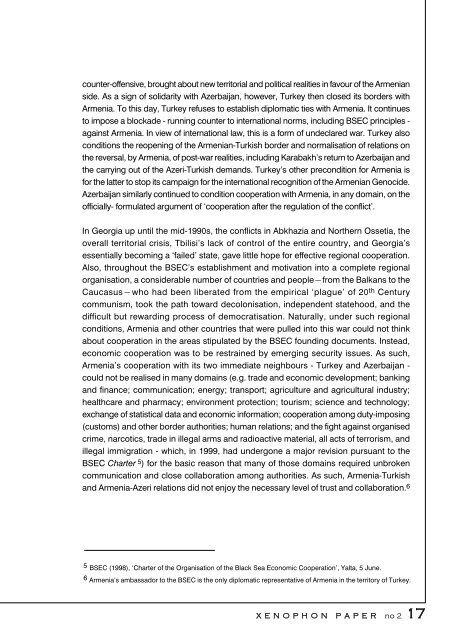Xenophon Paper 2 pdf - ICBSS
Xenophon Paper 2 pdf - ICBSS
Xenophon Paper 2 pdf - ICBSS
Create successful ePaper yourself
Turn your PDF publications into a flip-book with our unique Google optimized e-Paper software.
counter-offensive, brought about new territorial and political realities in favour of the Armenian<br />
side. As a sign of solidarity with Azerbaijan, however, Turkey then closed its borders with<br />
Armenia. To this day, Turkey refuses to establish diplomatic ties with Armenia. It continues<br />
to impose a blockade - running counter to international norms, including BSEC principles -<br />
against Armenia. In view of international law, this is a form of undeclared war. Turkey also<br />
conditions the reopening of the Armenian-Turkish border and normalisation of relations on<br />
the reversal, by Armenia, of post-war realities, including Karabakh’s return to Azerbaijan and<br />
the carrying out of the Azeri-Turkish demands. Turkey’s other precondition for Armenia is<br />
for the latter to stop its campaign for the international recognition of the Armenian Genocide.<br />
Azerbaijan similarly continued to condition cooperation with Armenia, in any domain, on the<br />
officially- formulated argument of ‘cooperation after the regulation of the conflict’.<br />
In Georgia up until the mid-1990s, the conflicts in Abkhazia and Northern Ossetia, the<br />
overall territorial crisis, Tbilisi’s lack of control of the entire country, and Georgia’s<br />
essentially becoming a ‘failed’ state, gave little hope for effective regional cooperation.<br />
Also, throughout the BSEC’s establishment and motivation into a complete regional<br />
organisation, a considerable number of countries and people—from the Balkans to the<br />
Caucasus—who had been liberated from the empirical ‘plague’ of 20 th Century<br />
communism, took the path toward decolonisation, independent statehood, and the<br />
difficult but rewarding process of democratisation. Naturally, under such regional<br />
conditions, Armenia and other countries that were pulled into this war could not think<br />
about cooperation in the areas stipulated by the BSEC founding documents. Instead,<br />
economic cooperation was to be restrained by emerging security issues. As such,<br />
Armenia’s cooperation with its two immediate neighbours - Turkey and Azerbaijan -<br />
could not be realised in many domains (e.g. trade and economic development; banking<br />
and finance; communication; energy; transport; agriculture and agricultural industry;<br />
healthcare and pharmacy; environment protection; tourism; science and technology;<br />
exchange of statistical data and economic information; cooperation among duty-imposing<br />
(customs) and other border authorities; human relations; and the fight against organised<br />
crime, narcotics, trade in illegal arms and radioactive material, all acts of terrorism, and<br />
illegal immigration - which, in 1999, had undergone a major revision pursuant to the<br />
BSEC Charter 5 ) for the basic reason that many of those domains required unbroken<br />
communication and close collaboration among authorities. As such, Armenia-Turkish<br />
and Armenia-Azeri relations did not enjoy the necessary level of trust and collaboration. 6<br />
5 BSEC (1998), ‘Charter of the Organisation of the Black Sea Economic Cooperation’, Yalta, 5 June.<br />
6 Armenia’s ambassador to the BSEC is the only diplomatic representative of Armenia in the territory of Turkey.<br />
X E N O P H O N P A P E R no 2 17









